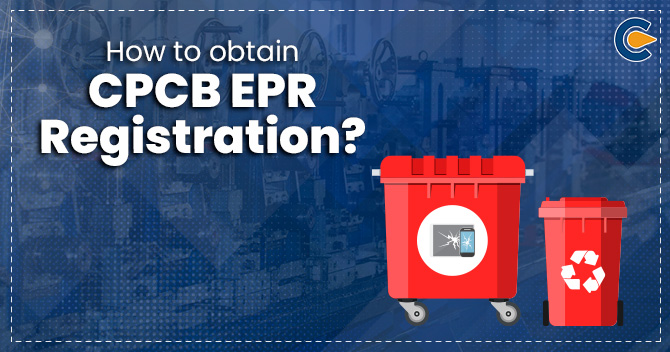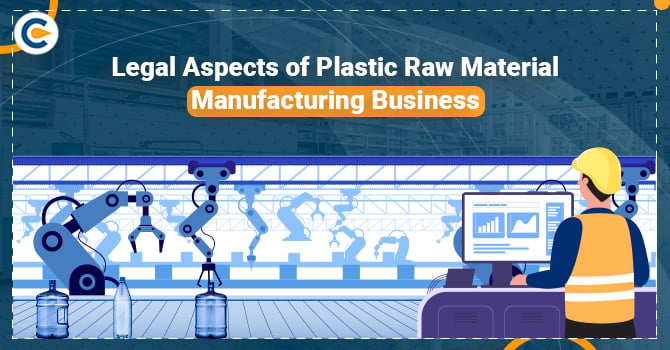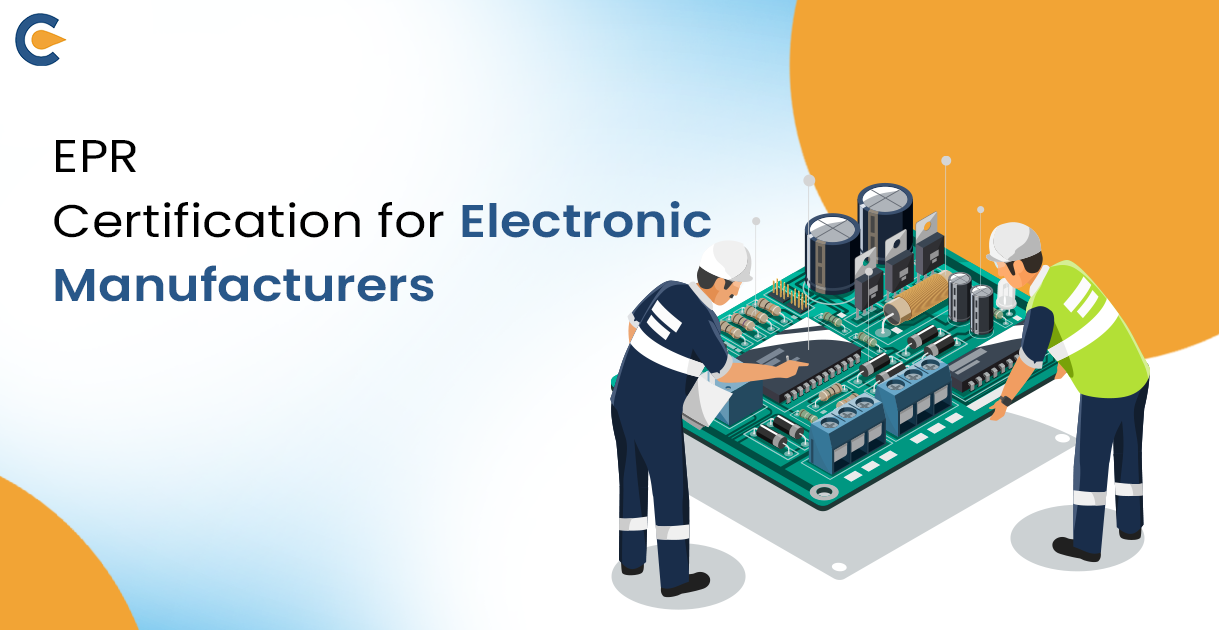With the Indian Government taking various initiatives to obtain Swachh and sustainable Bharat, it is very important for all the other stakeholders as well to work in a collaborative manner in order to achieve a healthy environment. The different stakeholders may include producers, manufacturers, consumers and Brand Owners who have the liability and Responsibility to properly manage the waste created by them during the manufacturing process.
This Responsibility bestowed upon the producers/Importers/Brand Owners to properly manage the waste produced is called extended producers’ Responsibility. In India, EPR is the statutory obligation of the producers that is part of the sustainable business practice governed by the Ministry of environment, forest and climate change, regulated under the plastic waste and E-Waste management Rules. Under these rules, it is mandatory for the producers/Importers/Brand Owners to obtain CPCB EPR Registration to function.
Central Pollution Control Board (CPCB)
Central Pollution Control Board was first established as per the provisions of The Water (Prevention & Control of Pollution) Act, 1974 under the nomenclature “The Central Board for the Prevention and Control of Water Pollution”, which was later amended to CPCB. Later with the enactment of different acts, including the Air (Prevention & Control of Pollution) Act, 1981 and The Environment (Protection) Act, 1986, the scope of Responsibility of the Central Pollution Control board was widened to accommodate the new acts.
Although these acts are governed by the Ministry of Environment, Forest and Climate change, MoEFCC has delegated the Responsibility to the central pollution control board to overlook the activities of the enterprises, industries or any other concerning the matter which comes under the domain of the environment law.
Functions of Central Pollution Control Board
The primary functions of CPCB are mentioned under The Water (Prevention & Control of Pollution) Act, 1974 and The Air (Prevention & Control of Pollution) Act, 1981[1], which are:-
- CPCB has the Responsibility to promote the cleanliness of wells and water bodies located in the different parts of the states via the prevention, reduction and control of Water Pollution.
- Also, to improve the Air quality via prevention, reduction and control of Air Pollution.
CPCB is also allocated with the additional National level function, apart from these primary functions. Some of them are:-
- Act as an advisory body for the Central Government regarding matters related to the management of Air and Water pollution.
- Design and execute the countrywide program with regard to the management of Air and Water Pollution.
- Overlook the functions and activities of the state pollution Control Board and resolve any differences occurring among them.
- Act as an assisting body for state pollution control board by providing them technical guidance along with this also participate and sponsor in the any investigation and research happening in the matter of management of Air and Water Pollution.
- Design and execute the training sessions for personnel involved in programs related to the management of Air and Water Pollution.
- Organised a comprehensive awareness program with the help of various mass media on prevention, reduction and control of Air and Water Pollution.
- Organise for statistical and technical data collection compilation and publication relating to air and water pollution as well as design plans and measures for its management.
- Recognise or institute labs for the board to carry out its functions.
- Perform any functions which are directed by the Government of India.
Why is CPCB EPR registration beneficial?
CPCB EPR Registration is beneficial not only for Producers’/Importers/Brand Owners but also for the central pollution control board/State Pollution Control Board by providing them with pore to keep in track of the activities of the Producers’/Importers/Brand Owners who have acquired CPCB EPR registration.
Apart from this, the Producers’/Importers/Brand Owners are benefitted because:-
- They provide proper guidelines and procedures for the treatment of waste.
- It provides incentives to Producers’/Importers/Brand Owners to curb pollution related to plastic products or electrical products.
- It urges the producers/Manufacturers to make sustainable products by using renewable resources.
- It sets standards for manufacturing in order to provide assistance to Producers/Manufacturers.
Process of CPCB EPR Registration.
Extended producers’ Responsibility in India is mandated under two laws E-Waste (Management) Rules and Plastic waste (Management) Rules.
CPCB EPR Registration under Plastic Waste (Management) Rules
Producers’/Importers/Brand Owner have to acquire CPCB EPR registration under the Plastic Waste (Management) Rules. They have three alternatives for the execution of the extended producers’ Responsibility action plan:-
- Plastic Waste Management through direct engagement with Urban Local Body
- Plastic Waste Management through engagement with waste management agency (WMA), which in turn should engage with Urban Local Body.
- Plastic Waste Management by their own distribution channel.
Process of registration
The process of CPCB EPR registration involves procedure with the following steps:-
- Producers’/Importers/Brand Owners are required to apply for the CPCB EPR Registration by filling up an application giving detailed information on the plant/enterprise and personal details. This application can be filled out through the online registration portal with the required application.
- Producers are required to submit the FORM I. In contrast, every manufacturer is required to file FORM III, and every recycler or person involved in the recycling process is required to fill FORM II.
- The application filled according to the forms is to be submitted along with the documents required.
- The documents are to be attested or signed by the concerned authority.
- After the application is filled out, the form is submitted to the appropriate authority.
- The CPCB or the concerned Pollution Control Committee examine the application for shortcomings which is then communicated to the applicant within seven working days.
- In case the applicant has not responded within thirty days, the application is presumed to be withdrawn.
- Suppose, within 30 days of the filing of the complete application with the required document, there is no response from the central pollution control board. In that case, the registration certificate will be presumed to have been generated.
Documents required for CPCB EPR Registration under Plastic Waste Management Rule
- More than two states’ proof of sale (GST/tax invoice, etc.)
- If the unit has a production facility, a DIC certificate is required.
- If the unit contains a production facility, valid consents under the Air and Water Act are required.
- Documents pertaining to the EPR Liability Action Plan (by state/UT)
- Document relating to PIBO/WMA engagement issued by ULB / authorised state authority (as applicable)
- SPCBs/PCCs issue registrations to PWPF in order for them to work with them on PW processing. PIBO/WMA enters into a PW processing agreement with PWPF (as applicable)
- WMA and PIBO have reached an agreement (as applicable)
CPCB EPR Registration under E-waste (Management) Act
CPCB EPR Registration of the producers’ of Electrical and Electronic Equipment (EEE) as stipulated under Rule 13 (1), (2), (3) and (4) of E-Waste Management Rules, 2016.
- The application under Form 1 is to be filled by the applicant, which will include the details information about the operating plant as well as producers’.
- Details on E-Waste generation of Electric or Electronic equipment item-wise are to be provided along with approximate target collection for the upcoming year.
- Extended Producers’ Responsibility action plan information needs to be provided.
- The application form submitted should accompany the required document.
- After submission, the application will be reviewed by Central Pollution Control Board.
- After the application is reviewed, the EPR Certificate will be provided by CPCB.
Documents required under E-Waste Management Rules
Documents required for OPC/LLP/Sole Proprietor and partnership firm
- Importer Exporter Code
- Authorized Signatory KYC or Sole proprietor
- submit the rent or lease proof to demonstrate the ownership of the site
- Excel sheet including details of imported products.
- GST Certificate
Documents Required for Private or Public Limited Company
- Memorandum of Association.
- Earlier mentioned documents.
- Certification of Incorporation (CIN).
- Company’s PAN card.
- Board Declaration for Authorized Signatory.
Conclusion
CPCB EPR registration makes sure that the activities of the producers in regard to their extended producers’ Responsibility remain on track and regulated. But to strengthen the regulations regarding the operation of EPR more, the Government introduced a new draft of the EPR framework for uniform EPR in 2022. These guidelines are accompanied by the prohibition of identified single-use plastic that has low utility and high littering potential. Also, as per the new norms, the “Environment Compensation” will be imposed on the producers as per the “Polluter pays Principle”, which will again act as an additional incentive for producers to understand their responsibility towards the environment.
Read our Article:How to become Producer Responsibility Organization?











